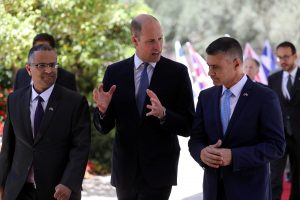
By Dan Williams
JERUSALEM (Reuters) – Prince William honoured Holocaust victims and met descendants of Jews hidden from the Nazis by his great-grandmother, in a somber start on Tuesday to the first official British royal visit to Israel and the Palestinian Territories.
Wearing a black skullcap, William laid a wreath in the Hall of Remembrance at Israel’s Yad Vashem Holocaust memorial, where an eternal flame flickers and the names of extermination and concentration camps are engraved in the floor.
“Terrifying,” William said, viewing a display at the memorial’s museum of shoes taken by the Nazis from Jews at Majdanek death camp. “(I’m) trying to comprehend the scale.”

Britain’s Prince William speaks with officials as he arrives to the residence of Israeli President Reuven Rivlin in Jerusalem, June 26, 2018. REUTERS/Ammar Awad
Tens of thousands of Jews and other victims were killed at the camp, near Lublin in what is now Poland.
After the tour, the prince – second in line to the British throne – was greeted by Prime Minister Benjamin Netanyahu and his wife, Sara, at their official residence in Jerusalem against the backdrop of British and Israeli flags.
At the residence, the prince met relatives of the late Rachel Cohen, who was hidden from the Gestapo, along with two of her five children, by Princess Alice, the mother of Britain’s 97-year-old Prince Philip, in her palace in Greece.
The Greek royal family – Princess Alice was married to Prince Andrew of Greece – had been acquainted with Cohen’s late husband, Haimaki, a former member of Greece’s parliament.
“You must be very proud of your great-grandmother, who saved defenseless Jews,” Netanyahu told William.
Princess Alice was recognized as one of the “righteous among nations”, gentiles who rescued Jews, by Yad Vashem in 1993. A devout Christian, she is buried on the slopes of Jerusalem’s Mount of Olives. William is due to visit her tomb on Thursday.
At a meeting with Israeli President Reuven Rivlin, the prince, on a visit described by Britain as non-political, said he hoped “peace in the area can be achieved”. Israeli-Palestinian peace talks collapsed in 2014.
During the four-day visit, William is also scheduled to meet Palestinian President Mahmoud Abbas and Palestinian youngsters in the occupied West Bank.
“I had a very moving tour around Yad Vashem this morning, which really taught me quite a lot more than I thought I already knew about the true horrors of what happened to the Jews
over the war,” William said at the meeting with Rivlin.
The prince also spoke at Yad Vashem with two men who survived the Nazi genocide through British intervention.
Henry Foner, 86, and Paul Alexander, 80, were among thousands of Jewish children taken in by Britain as part of the 1930s “Kindertransport” from a continental Europe that was falling to German conquest.
“I said to his Royal Highness that this is a unique opportunity for me to express my thanks to the British people for opening their homes to me and to the other 10,000 children who came,” Alexander said.
Later in the day, William, sporting sunglasses, strolled along the Tel Aviv shore, chatting with beach-goers and quipping, “I should have brought my swimming trunks”. At a youth soccer event in nearby Jaffa, he admonished journalists crowding around the youngsters to move back.
“Guys, will you give us some space, there are children here,” said the prince, who from his earliest years experienced crowds of journalists and photographs hounding his mother, the late Diana, Princess of Wales. She died in a car crash in Paris in 1997 as paparazzi chased her vehicle.
William’s trip is at the behest of the British government. Until now it had been British policy not to make an official royal visit until the Israeli-Palestinian conflict was resolved. British officials have given no detailed explanation for the change in policy.
(Writing by Jeffrey Heller; Editing by Matthew Mpoke Bigg)





